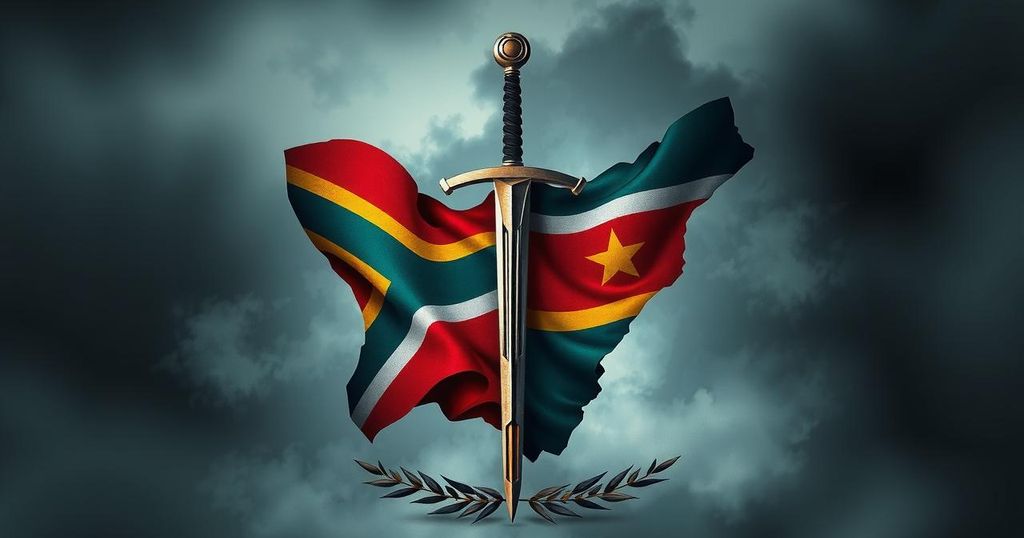The diplomatic friction between South Africa and Rwanda has intensified as President Cyril Ramaphosa accused the Rwanda-backed M23 rebels of killing South African peacekeepers, leading to South Africa threatening a “declaration of war”. In response, Rwanda’s President Paul Kagame condemned South Africa’s involvement. Recent violent clashes in eastern DRC have heightened tensions, with South Africa’s military capability under scrutiny.
The diplomatic relations between South Africa and Rwanda have escalated due to President Cyril Ramaphosa’s accusations against the Rwanda-supported M23 rebel group, allegedly responsible for the deaths of South African peacekeepers in the Democratic Republic of the Congo (DRC). Following significant gains in the battlefield by the M23, South Africa warned that any further attacks on its troops would amount to a “declaration of war.” In a response, President Paul Kagame of Rwanda criticized South Africa for engaging in “offensive combat operations” that allegedly support the Congolese government’s actions against its own citizens.
The escalation of hostilities has led to a heartbreaking toll, with 13 South African soldiers killed in recent fighting as the M23 captured significant territories leading up to Goma, a key city in the region. The historical tensions between the two nations have surfaced again, particularly after the recent deployment of South African troops to the DRC as part of a regional peacekeeping initiative under the Southern African Development Community (SADC). South African soldiers constitute the majority of this peacekeeping force, tasked with protecting the region against armed groups like the M23.
Tensions were compounded by a social media post in which President Ramaphosa revealed a conversation he had with President Kagame to emphasize the need for a ceasefire. Ramaphosa, however, indicated that the M23 and the Rwanda Defence Force (RDF) were to blame for the attacks that killed South African soldiers, leading Kagame to dismiss claims as erroneous and emphasize that the RDF is a recognized army, not a militia.
Kagame reiterated Rwanda’s perspective that South Africa had no authority to act as a mediator in the conflict and suggested a need for South Africa to pull back from its military engagement in the DRC. Historically, South Africa’s military involvement in the region has been tied to its transition from apartheid to a force aimed at regional stability, impacted by its economic interests in DRC’s mineral-rich eastern provinces.
Despite South Africa’s peacekeeping mission leading to initial successes against the M23, its capabilities have diminished over time, affecting its operational effectiveness against well-armed rebel groups. The economic constraints on South Africa’s military have hindered its ability to provide necessary air cover and reinforcements, putting troops in vulnerable positions. The situation is precarious, with discussions ongoing regarding the potential withdrawal of South African forces hinged on SADC’s decisions amidst rising tensions in the region.
The conflict in the DRC has involved multiple armed groups, notably the M23, which has historically sought to seize power in eastern regions rich in minerals. South Africa has maintained a military presence in the DRC as part of peacekeeping efforts since the 1990s, driven by a desire for regional stability and economic interests in mineral resources. Relations between South Africa and Rwanda have been strained due to differing aspirations and historical grievances, further complicated by recent military engagements. As of December 2023, specific incidents and accusations have reignited long-standing tensions. Ongoing violence and armed conflict have claimed numerous lives among South African peacekeepers, prompting stern diplomatic exchanges between Pretoria and Kigali. The geopolitical dynamics in the DRC are laden with historical complexities, monetary interests, and issues of sovereignty, complicating peacekeeping efforts.
In conclusion, the diplomatic discord between South Africa and Rwanda is at a critical juncture, marked by increasing hostilities following the deaths of South African soldiers by the M23 rebel group in the DRC. Both nations face challenging choices regarding military engagement as accusations of blame circulate. As negotiations for a ceasefire loom, the international community watches closely, recognizing the need for both countries to navigate this precarious situation without escalating conflict further. Ultimately, the ongoing debate around South Africa’s military role in the DRC necessitates careful reflection on its strategic interests and humanitarian responsibilities.
Original Source: www.bbc.com




